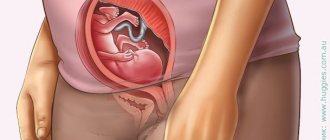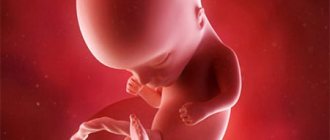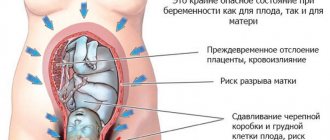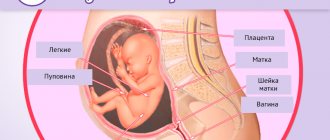The 15th week of pregnancy is the time when the expectant mother’s well-being returns to normal and her appetite awakens. Now I want to eat for two. However, you should not allow yourself to eat too much, and it is also important to ensure that the food is not only satisfying, but also healthy. The tummy becomes more and more rounded and becomes noticeable. Now it is difficult to hide it under clothes.
At the same time, week 15 is just the beginning of the journey; there are still many exciting moments ahead, some pleasant and some not so pleasant. The baby still needs to grow up and get stronger before it is born.
What happens to the mother at 15 weeks of pregnancy?
With the beginning of the 14-15th week of pregnancy, the baby increasingly needs the nutrients it receives from the mother. Therefore, it is often during this period that pregnant women notice increased brittleness of nails, dry skin, dulling of hair and increased hair loss. All these are signals from the expectant mother’s body, indicating that there is not enough calcium in her diet.
The daily menu of a pregnant woman must necessarily contain fermented milk products, especially cottage cheese. In this case, you need to eat natural cottage cheese, and not curd mass or cheesecakes. It is also important to drink at least 2 liters of clean drinking water every day.
The uterus continues to increase in size. At 14-15 weeks it completely passes into the abdominal cavity. Now it does not put pressure on the bladder, and the woman can forget about the frequent urge to go to the toilet for a while. However, it continues to put pressure on the intestines, so one of the most striking symptoms of pregnancy at this stage can be constipation, diarrhea, and digestive disorders. You can avoid such problems by taking care of a proper diet and a balanced diet, which must include fresh vegetables and fruits.
At 15-16 weeks of pregnancy, unpleasant sensations such as weakness and dizziness may appear. These symptoms are caused by iron deficiency in the expectant mother. Blood volume has increased and the body needs much more iron. Its content can only be determined by the results of a blood test, which will have to be taken monthly. If iron levels are low, medications are prescribed that can increase its concentration. There is no need to completely rely on medications, vitamin and mineral complexes; it is better if nutrients enter the body of the mother and child naturally - through food.
The daily requirement of iron for pregnant women is 30 mg. Meat, seafood, eggs, nuts, dried fruits, vegetables, legumes and fruits (pomegranate, apple, persimmon) are rich in iron.
An increase in the amount of blood can cause nosebleeds. This is considered the norm. However, if your nose bleeds quite often, it is better to consult a doctor about this problem.
At 15 weeks the breasts become larger and the nipples usually darken. There is a need to replace the usual underwear and clothes with a larger size.
Belly at 15 weeks of pregnancy
Doctor's advice about the 15th week of pregnancy
The fifteenth week of pregnancy has arrived.
This period for the expectant mother is relatively calm compared to others. Nausea and vomiting go away, toxicosis disappears, your appetite stabilizes, or rather your appetite wakes up, your blood pressure normalizes, and during this period you will react quite normally to smells. In other words, it is the fifteenth week that helps you forget about the troubles that happened to you in previous periods. Yes, at the 15th week of pregnancy the stomach feels tight, as the fetus becomes larger, and the discharge may even increase at the 15th week of pregnancy, but this should not scare you. Naturally, your doctor’s advice about the 15th week of pregnancy will help you learn a lot of useful information that will certainly come in handy. At this stage, the placenta has practically formed and is now quite firmly connected to the fetus. In addition, the fifteenth week of pregnancy is the starting point when the placenta begins to supply the fetus with oxygen, as well as nutrients from the mother, and also helps remove unnecessary substances from the child’s body. If at 15 weeks you are pregnant with twins, you will be placed in a special group, and you will have to be examined more carefully and more often than others.
The placenta will provide the fetus with the necessary proteins and hormones; during this period, your stomach resembles a swimming pool in which the baby is developing. It swims in the amniotic fluid, which in turn is renewed about ten times a day. Therefore, they maintain their chemical composition and sterility.
your breasts begin to swell as the mammary glands enlarge. In any case, you will need to monitor your breasts. Since stretch marks may appear, wear a bra all the time; some even sleep in it at night, especially since this is the doctor’s advice at 15 weeks of pregnancy.
The baby's skeleton begins to develop, and the arms become shorter than the legs. At this stage, the hairs on the head have become a little stiffer, the ears and eyes are already in their places, and in addition, the child can distinguish voices. On an ultrasound, you can already see not only the gender of the unborn baby, but also how it sucks its thumb. All the bones have finally formed, they began to accumulate calcium, so you may feel cramps, in order to prevent this from happening, you need calcium, eat more cottage cheese.
Don’t forget about a healthy lifestyle; it won’t hurt to do gymnastics for pregnant women, which will help you prepare for childbirth and keep your body in great shape after it. This will significantly strengthen your baby.
Baby at 15 weeks of pregnancy. Fetal development
The baby's legs are growing more actively than in the first trimester. Now they are already longer than their arms. The baby's body proportions are becoming more correct every day. The eyes are now closer to each other, and the ears are already fully formed, which means the baby hears sounds and voices. Small hairs gradually appear on the child's body.
At week 15, the baby’s sweat glands begin to function properly. The pituitary gland also begins to function. The fruit continues to actively develop and improve. His skin gradually takes on a lighter shade and becomes less transparent.
The baby moves much more dynamically. The mother may still not feel his movements at all, this is not scary; by the 18th week the baby will certainly make itself known with the first tremors.
The size of the fetus at week 15 is about 11-14 cm, weight is about 60-70 grams. Gender differences appear, which can already be seen by a specialist on ultrasound. It is from the 15th week of pregnancy that it becomes possible to find out the sex of the child.
Causes of prolonged intoxication
So, if nausea at 15 weeks of pregnancy and toxicosis continue to bother you, this is mostly due to the following reasons:
- Incorrectly calculated gestational age.
- You are taking medications that cause nausea.
- The factor causing toxicosis depends on the conflict between the blood groups of mother and child.
- The fetal placenta at 15 weeks develops with defects.
- Infections and exacerbations of certain chronic diseases. The body's messages in the form of brown discharge, indicating problems, should be especially alert.
The exact cause of toxicosis at week 15 will only be revealed by an observing doctor after conducting a full comprehensive examination and the results of biochemical and general blood tests of the woman, as well as a number of other tests. The treatment method will depend on the data obtained.

***
Your task is not to look for the causes of toxicosis at week 15 on your own and believe everything that can be found on the Internet, but to report problems to your doctor in a timely manner may be an exacerbation of gastritis or any other chronic disease.
Frequently asked questions on the forums
1:
V.: I’m 15 weeks and I don’t feel pregnant at all. The belly is not growing, the breasts seem to have become smaller. Could there be something wrong?
A: At 14-15 weeks, many mothers stop feeling pregnant. This is due to the fact that all the symptoms that were so pronounced in the first trimester disappear by this time. The belly has not yet begun to actively grow, and the baby’s movements are not yet felt. After a week or two, the feeling of pregnancy will return.
2:
Q: Why does my stomach hurt at 15 weeks?
A: The stomach can hurt in different ways. The intestines may hurt, as digestive problems become more frequent during this period. Mild pulling pains in the abdomen may indicate that the muscles are being stretched due to the growth of the uterus. Severe cramping pain in the lower abdomen indicates a risk of miscarriage. If the pain is like this, call the hospital immediately.
3:
Q: How do you know that everything is going well at 15 weeks of pregnancy? I don’t feel any signs, only my breasts have become a little larger. Many people are afraid of a frozen pregnancy; how do you know that everything is okay with the baby?
A.: Frozen pregnancy is a rare occurrence, you should not be afraid of it. As a rule, if the mother is healthy and does not have serious illnesses, there cannot be a frozen pregnancy. Worry less and don’t be nervous, because this is harmful for the baby, he already feels everything. In a couple of weeks you will begin to feel movements, this will be a sign that everything is fine with the baby. If it’s difficult to calm down and anxiety takes over, go for an ultrasound.
What happens to the fetus?
The main achievement of the 15th week is the formation of the fetal cerebral cortex and the active division of nerve cells. At this time, the process of development of the cerebral hemispheres will not end; it will last the entire fourth obstetric month. The smooth surface of the cortex is covered with grooves and convolutions, acquiring a typical structure. The number of neurons corresponds to the approximate norm, the formation of their processes begins. Now the central nervous system is able to perform even more functions and more accurately coordinate the activities of the fetus.
Active development of muscles and bones allows the child to perform a variety of movements. He can roll over, bend and straighten his legs and arms, clench his fists, and suck his fingers. Despite the fact that the epidermis consists of several layers, the skin of the fetus is not yet so dense as to hide the pattern of blood vessels. The hairline becomes thicker, you can see eyebrows and hairs on the head, as well as fluff on the body, which will disappear only a few days after birth. In the thickness of smooth and transparent skin, sebaceous and sweat glands begin their work.
Fetal parameters at 15 weeks:
- Weight – 70 g;
- KTR (coccygeal-parietal size) – 10 cm;
- Body length from heels to crown – 14 cm;
- Heart rate – 120-150 beats/min.
The baby's body proportions change as pregnancy progresses. Now he no longer looks like a clumsy “tadpole” - his body has become more proportional, and his legs, as expected, are longer than his arms. The genital organs are in the developmental stage, so it is still difficult to determine the gender of the child using ultrasound.
Activity of the internal organs of the fetus at week 15:
- The kidneys produce primary urine, which ends up in the amniotic fluid;
- The intestines develop;
- The liver produces bile, which will become the basis for the original feces - meconium;
- The endocrine glands of the male fetus begin to produce testosterone;
- The head cords are formed, the glottis is open;
- Receptors on the tongue and oral cavity are able to recognize the taste of food;
- The heart pumps more than 28 liters of blood per day.
Amniotic fluid is cleaned up to 10 times a day, so the child does not experience discomfort. Due to the intense work of the cardiovascular system, the skin of the fetus most often has an intense pink or red color.
Video about the prevention of stretch marks and the condition of the fetus at 15 weeks:
Feelings of a woman at 15 weeks
Each body is unique, as is each pregnancy. Some become sleepy and lethargic during the 2nd trimester, while others flutter and feel a constant surge of energy. Whatever the feelings and sensations, it is contraindicated for women to overexert themselves and sleep little, even if it seems that there is plenty of strength and energy. At this time, you need to take care of yourself and your baby.
Expectant mothers may notice that they have become distracted, inattentive and forgetful. Such feelings are quite natural. For some, they will pass by the onset of the third trimester, for others after childbirth. In any case, this is a temporary phenomenon and you should not worry too much.
It is interesting that despite the absent-mindedness, the information studied during this period is remembered very well and for a long time. This time can be used to read books that will help you advance your career in the future.
Risk factors
The 15th week is not considered a critical period, and the likelihood of miscarriage is minimal. But at this time, isthmic-cervical insufficiency may appear for the first time. This is a pathological condition in which the obturator ability of the cervix is impaired. As a result, the membranes of the fetus fall inside the canal, where its walls can become infected or even rupture.
Suspicion of isthmic-cervical insufficiency may appear with the following symptoms:
- Pain in the lower back and lower abdomen;
- Feeling of fullness in the vagina;
- Increased volume of discharge from the genital tract.
Risk groups include pregnant women with twins, women with hyperandrogenemia (increased levels of male sex hormones in the blood) and those who have undergone cervical surgery in the past.
If by 14–15 weeks of pregnancy you experience anything similar to the symptoms listed above, you should immediately consult a doctor. Isthmic-cervical insufficiency in the early stages is successfully treated.











